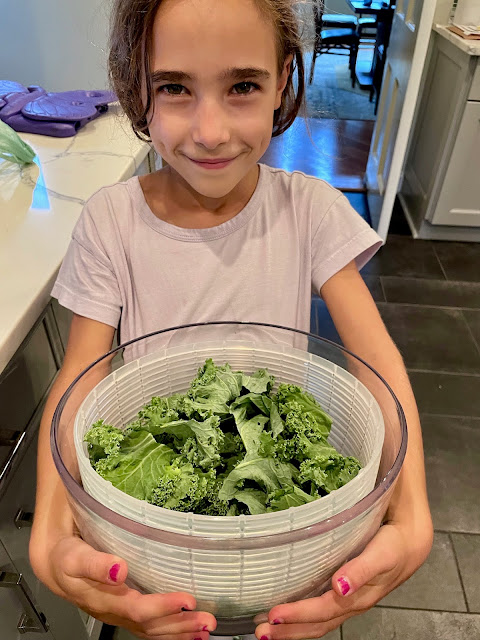Kale and Artichoke Pasta
Home-grown vegetables are precious gifts. When a friend supplied me with kale this week, I was pleased to be able to substitute it for the spinach in a recipe for "Creamy Spinach and Artichoke Pasta" (The Colorful Kitchen) on Vegan Vednesday.
I used this whole can of artichokes (drained), and about 10 ounces of dried pasta.
This isn't a "wow" dish, but it is simple to make, and it is good. Yes, grated cheese would make it better, because cheese is delicious. But The Guardian reminds us that animal agriculture accounts for 14.5% of the world’s greenhouse gas emissions. Once a week, at least, we can choose to set aside animal products for the sake of the planet, and it's not a hardship when you have solid recipes like this one at your fingertips.
I'm going to be perfectly honest about gift-giving, even though I know that this opinion makes me unpopular in some circles: I don't like the way the people I know give gifts, and the way I am expected to give gifts. It is fraught with the potential to generate waste. Our culture prizes the ability to surprise someone with "the perfect gift", so we do our best, but it is hard to know exactly what someone else wants or needs, so we have all received stuff that is imperfectly useful, or even useless, to us.
I used this whole can of artichokes (drained), and about 10 ounces of dried pasta.
This isn't a "wow" dish, but it is simple to make, and it is good. Yes, grated cheese would make it better, because cheese is delicious. But The Guardian reminds us that animal agriculture accounts for 14.5% of the world’s greenhouse gas emissions. Once a week, at least, we can choose to set aside animal products for the sake of the planet, and it's not a hardship when you have solid recipes like this one at your fingertips.
Speaking of the planet, a lot of my environmental reading lately has focused on consumerism. I was raised on materialism; maybe you were, too. We're all targets of marketing. I grew up wanting to own stuff, a lot of stuff.
But in recent years, my stuff has started to vex me, and everyone else's stuff vexes me, too. Cheap stuff breaks or falls apart, and often can't be repaired, for example. Or I acquire stuff by accident, like plastic utensils that appear in my takeout food bag even when I ask for them not to be included. Or I have plenty of stuff that I no longer need or want, and despite my efforts to give that stuff away, no one else needs or wants it, either. My stuff becomes trash, and trash is a huge environmental problem, on top of whatever environmental ills were perpetrated when the stuff was made and distributed in the first place.
I'm going to be perfectly honest about gift-giving, even though I know that this opinion makes me unpopular in some circles: I don't like the way the people I know give gifts, and the way I am expected to give gifts. It is fraught with the potential to generate waste. Our culture prizes the ability to surprise someone with "the perfect gift", so we do our best, but it is hard to know exactly what someone else wants or needs, so we have all received stuff that is imperfectly useful, or even useless, to us.
Here's some alternatives that I prefer to that stressful, wasteful model of gift-giving:
- Ask people what they want, and give them that exact thing (wedding guests, don't buy things not on the registry!).
- Give non-material things, like flowers or plants, drinks or food (kale?! ha!), tickets to an event, or a subscription to a streaming service or digital publication.
- Give secondhand items. Look for things in "like new" condition, or maybe your recipient is like me and doesn't mind receiving, say, a well-worn book.
We can be generous without being wasteful.





Comments
Post a Comment